-
 Bitcoin
Bitcoin $77,741.2042
-2.10% -
 Ethereum
Ethereum $1,483.7084
-5.24% -
 Tether USDt
Tether USDt $0.9996
0.01% -
 XRP
XRP $1.8283
-1.85% -
 BNB
BNB $556.0486
-0.39% -
 USDC
USDC $1.0002
0.02% -
 Solana
Solana $107.2186
-1.21% -
 Dogecoin
Dogecoin $0.1472
-1.84% -
 TRON
TRON $0.2292
-2.15% -
 Cardano
Cardano $0.5762
-1.14% -
 UNUS SED LEO
UNUS SED LEO $9.1349
1.86% -
 Toncoin
Toncoin $3.0824
-0.54% -
 Chainlink
Chainlink $11.4627
-1.15% -
 Avalanche
Avalanche $16.8086
-1.40% -
 Stellar
Stellar $0.2234
-1.98% -
 Hedera
Hedera $0.1549
-2.35% -
 Shiba Inu
Shiba Inu $0.0...01103
-2.35% -
 Sui
Sui $1.9882
-1.59% -
 MANTRA
MANTRA $6.2625
-0.24% -
 Bitcoin Cash
Bitcoin Cash $275.4681
-0.58% -
 Polkadot
Polkadot $3.4797
-3.23% -
 Dai
Dai $1.0003
0.02% -
 Litecoin
Litecoin $70.7217
-0.76% -
 Ethena USDe
Ethena USDe $0.9986
-0.03% -
 Bitget Token
Bitget Token $4.0982
-2.40% -
 Hyperliquid
Hyperliquid $12.3725
3.36% -
 Pi
Pi $0.5663
-2.21% -
 Monero
Monero $195.2899
-5.54% -
 OKB
OKB $51.4452
-1.06% -
 Uniswap
Uniswap $4.8766
-5.24%
How to avoid high fees when buying ETH?
Minimize ETH fees by choosing low-fee exchanges, buying during off-peak hours, using Layer-2 solutions, batching transactions, and adjusting gas prices strategically.
Mar 27, 2025 at 01:49 pm
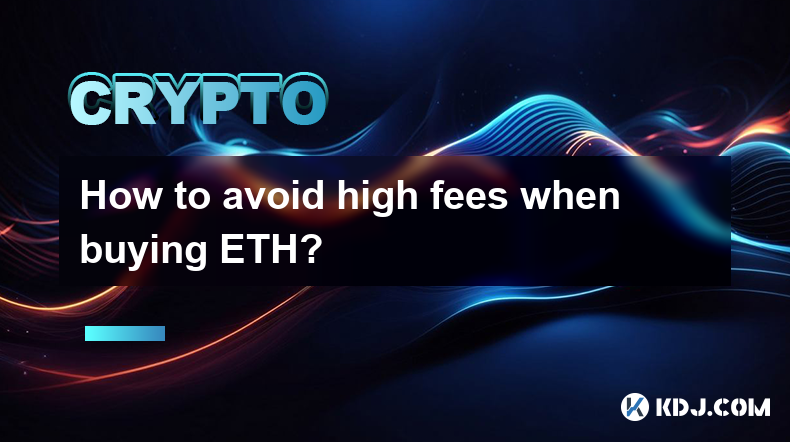
Understanding Ethereum Transaction Fees (Gas Fees)
Ethereum transaction fees, commonly known as gas fees, are the cost associated with processing transactions on the Ethereum network. These fees are paid in ETH to miners who validate and add your transaction to the blockchain. The amount you pay depends on two primary factors: the gas price (how much you're willing to pay per unit of gas) and the gas limit (the maximum amount of gas your transaction might consume). High gas prices, often driven by network congestion, lead to high transaction fees.
Strategies to Minimize ETH Purchase Fees
Several strategies can help you minimize the fees you pay when buying ETH. The optimal approach depends on your urgency and technical comfort level.
Choose the Right Exchange: Different cryptocurrency exchanges charge varying fees. Some exchanges may offer lower trading fees or even zero-fee options for specific trading pairs. Research and compare fees before choosing a platform. Consider factors beyond just the trading fee, including deposit and withdrawal fees.
Buy ETH During Off-Peak Hours: Network congestion is a major driver of high gas fees. Transaction fees tend to be lower during periods of lower network activity. Experiment with purchasing ETH during off-peak hours, often late at night or early morning in your time zone. This requires some flexibility.
Use Layer-2 Solutions: Layer-2 scaling solutions like Polygon, Optimism, and Arbitrum process transactions off the main Ethereum network, significantly reducing gas fees. You can buy ETH on these layer-2 networks and then bridge it to the main Ethereum network when needed, incurring lower fees overall. However, this involves additional steps.
Batch Transactions: If you need to perform multiple transactions, consider batching them together. This reduces the overall number of transactions, lowering the total gas fees. Many wallets and decentralized applications (dApps) offer batch transaction capabilities.
Adjust Gas Price Settings: Most wallets allow you to manually adjust the gas price. Setting a slightly lower gas price can save you money, but it may also increase the time it takes for your transaction to be confirmed. This is a balance between speed and cost. You need to be aware of potential delays.
Utilize a Decentralized Exchange (DEX) with Lower Fees: Some DEXs have lower transaction fees compared to centralized exchanges (CEXs). However, DEXs often require more technical knowledge to use. Be sure to understand the platform's mechanics before using it.
Consider Using a Different Cryptocurrency: If your primary goal is to access decentralized finance (DeFi) applications on Ethereum, consider using a different cryptocurrency with lower transaction fees to interact with those applications. This might involve converting your assets later.
Understanding Gas Price and Gas Limit
Gas Price: This is the price you're willing to pay per unit of gas. A higher gas price increases your chances of faster transaction confirmation. The gas price is typically expressed in Gwei (1 Gwei = 0.000000001 ETH).
Gas Limit: This is the maximum amount of gas your transaction is allowed to consume. Setting a gas limit too low can result in transaction failure. Most wallets automatically estimate the gas limit for you, but you can adjust it if needed. Ensure you understand the implications before adjusting.
Choosing the Right Wallet
Your choice of wallet can also influence transaction fees. Some wallets offer better gas fee optimization features than others. Research and compare different wallets to find one that suits your needs and offers efficient gas fee management. Consider the security features and user experience as well.
Timing Your Purchases Strategically
Monitoring network activity and buying ETH during periods of low congestion can significantly reduce transaction fees. Various websites and tools track gas prices in real-time, allowing you to time your purchases strategically. Patience is often rewarded with lower fees.
Exploring Alternative Methods
For larger ETH purchases, consider using a custodian or a specialized service that facilitates large transactions and potentially negotiates lower fees. This approach may be more suitable for institutional investors or high-volume traders.
Frequently Asked Questions
Q: What is the average ETH gas fee?
A: The average ETH gas fee is highly variable and depends on network congestion. It can range from a few cents to tens of dollars, sometimes even more during periods of high demand. There's no fixed average.
Q: Can I avoid gas fees altogether?
A: No, gas fees are inherent to the Ethereum network. They compensate miners for processing transactions. However, you can minimize them using the strategies discussed above.
Q: Are gas fees the same for all transactions?
A: No, gas fees vary based on the complexity of the transaction. More complex transactions, such as smart contract interactions, generally require more gas and therefore incur higher fees.
Q: How can I monitor ETH gas prices?
A: Several websites and tools provide real-time gas price tracking. Many wallets also display current gas price estimations. Look for reputable sources to get accurate information.
Q: What are Layer-2 solutions, and how do they help reduce fees?
A: Layer-2 solutions are technologies that process transactions off the main Ethereum blockchain, reducing congestion and lowering gas fees. They then settle transactions on the main chain periodically.
Q: Is it safe to use Layer-2 solutions?
A: The security of Layer-2 solutions varies depending on the specific implementation. Reputable Layer-2 solutions employ robust security measures, but it's crucial to research and choose a trusted provider.
Q: What happens if I set my gas price too low?
A: If you set your gas price too low, your transaction might not be included in a block for a long time or may fail entirely. Miners prioritize transactions with higher gas prices.
Q: What are the risks associated with manually adjusting the gas price?
A: Setting the gas price too low risks transaction failure or significant delays, while setting it too high results in unnecessary cost. Careful monitoring and understanding are crucial.
Q: Are there any tools that help optimize gas fees?
A: Some wallets and third-party tools offer gas fee optimization features, suggesting optimal gas prices based on network conditions. However, always double-check these recommendations.
Disclaimer:info@kdj.com
The information provided is not trading advice. kdj.com does not assume any responsibility for any investments made based on the information provided in this article. Cryptocurrencies are highly volatile and it is highly recommended that you invest with caution after thorough research!
If you believe that the content used on this website infringes your copyright, please contact us immediately (info@kdj.com) and we will delete it promptly.
- BTFD Coin: The Next Big Meme Coin With Staking Rewards and a Play-to-Earn (P2E) Game
- 2025-04-09 16:00:13
- These 4 Altcoins (ETH, BNB, DEBO, SOL) Can Provide Insane Performance
- 2025-04-09 16:00:13
- Top 5 Performers from HTX’s Crypto Gem Hunt #2
- 2025-04-09 15:55:12
- TZ APAC Launches the Second Cohort of Its Fortify Labs Program, Targeting Startups Building on Tezos or Etherlink
- 2025-04-09 15:55:12
- Introducing A(i)gentFi, the One-Stop Shop for AI Agent Creation on ZKsync
- 2025-04-09 15:50:12
- Rain Labs Raises $15M From Galaxy Ventures, Goldcrest, Thayer, and Hard Yaka to Expand Its Global Reach
- 2025-04-09 15:50:12
Related knowledge
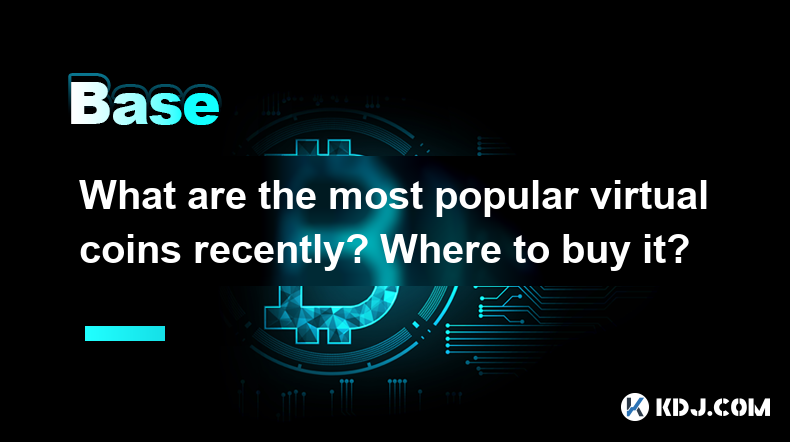
What are the most popular virtual coins recently? Where to buy it?
Apr 07,2025 at 01:28pm
Buying virtual currencies is usually possible through some of the following large cryptocurrency exchanges: Binance: As one of the world's top cryptocurrency trading platforms, Binance has attracted more than 100 million active users, with daily trading volumes of US$80-90 billion, providing excellent trading depth and liquidity. The platform suppor...
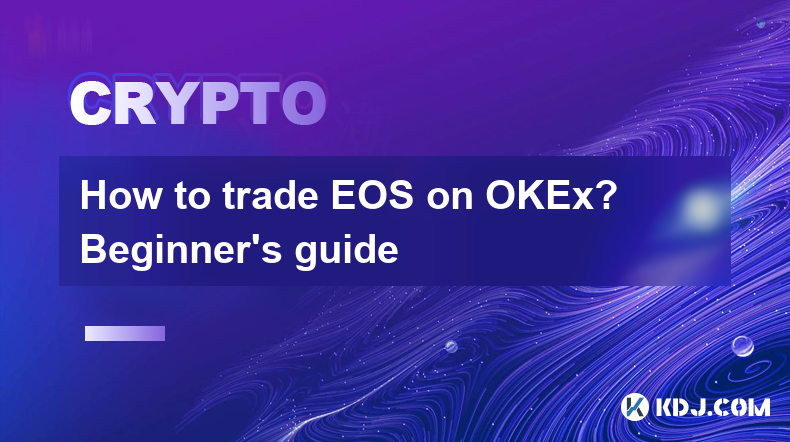
How to trade EOS on OKEx? Beginner's guide
Apr 04,2025 at 09:36am
Trading EOS on OKEx can be an exciting venture for beginners eager to dive into the world of cryptocurrency. To get started, you'll need to understand the basics of trading, familiarize yourself with OKEx's platform, and learn how to manage your investments effectively. This beginner's guide will walk you through the steps to trade EOS on OKEx, from set...
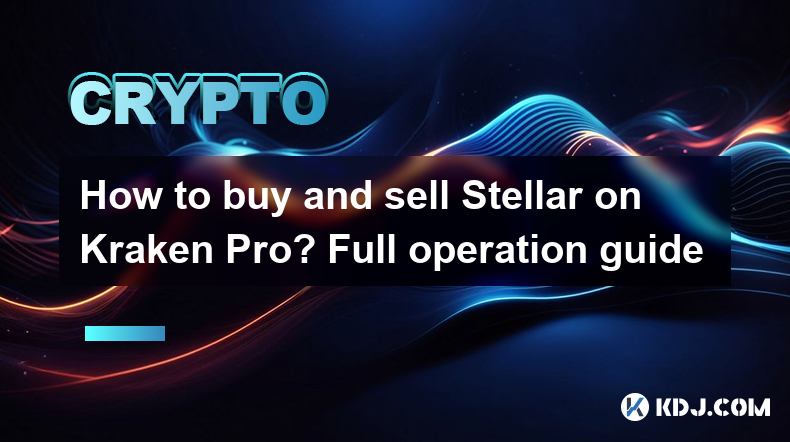
How to buy and sell Stellar on Kraken Pro? Full operation guide
Apr 05,2025 at 09:00pm
Buying and selling Stellar (XLM) on Kraken Pro is a straightforward process, but it requires a clear understanding of the platform and its features. Kraken Pro, formerly known as Kraken Futures, is a professional trading platform designed for experienced traders who are looking for advanced trading tools and features. In this guide, we will walk you thr...
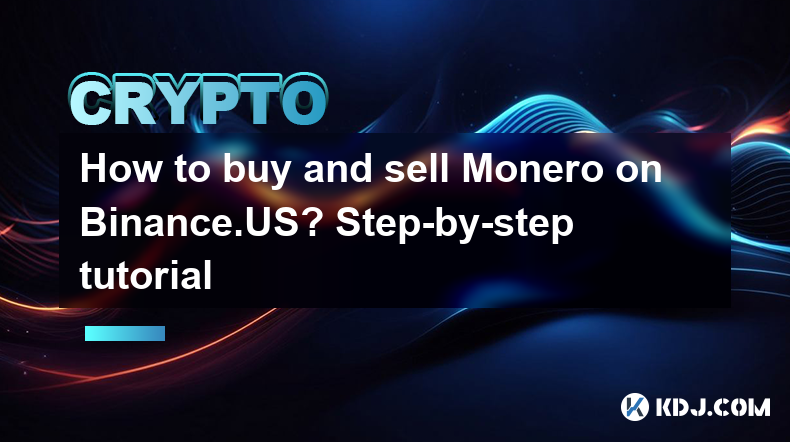
How to buy and sell Monero on Binance.US? Step-by-step tutorial
Apr 04,2025 at 03:49am
Binance.US is a popular cryptocurrency exchange that allows users to trade various digital assets, including Monero (XMR). Monero is a privacy-focused cryptocurrency that uses advanced cryptography to ensure transaction anonymity. If you're interested in buying or selling Monero on Binance.US, this step-by-step tutorial will guide you through the proces...
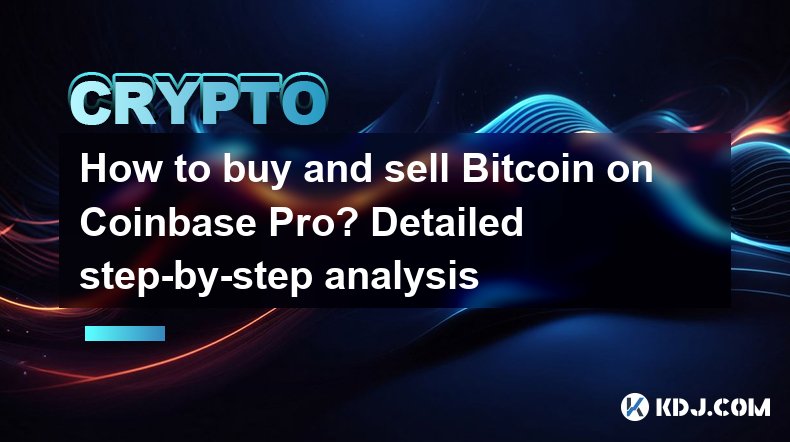
How to buy and sell Bitcoin on Coinbase Pro? Detailed step-by-step analysis
Apr 05,2025 at 10:56am
Coinbase Pro, previously known as GDAX, is a professional trading platform that offers advanced trading features for buying and selling cryptocurrencies like Bitcoin. To effectively use Coinbase Pro, it's essential to understand the platform's interface, trading options, and the detailed steps required for transactions. This article will provide a compr...
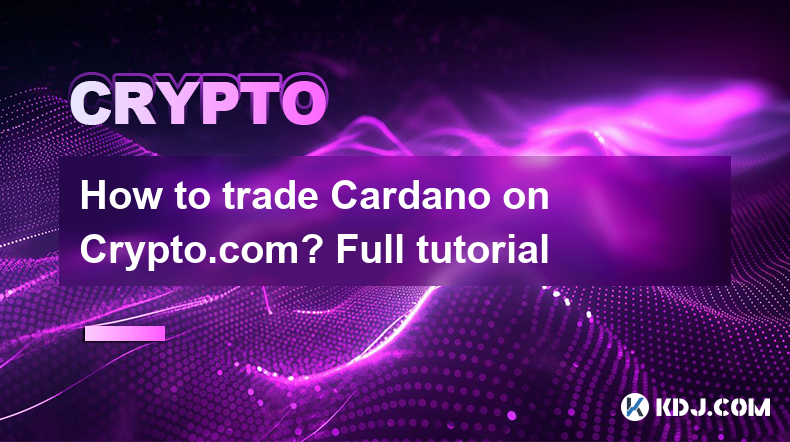
How to trade Cardano on Crypto.com? Full tutorial
Apr 03,2025 at 04:49am
Trading Cardano (ADA) on Crypto.com is a straightforward process that can be accomplished by following a few key steps. Cardano, one of the leading cryptocurrencies, is popular among investors for its potential and technological advancements. Crypto.com, a well-known platform in the crypto world, offers a user-friendly interface to buy, sell, and trade ...

What are the most popular virtual coins recently? Where to buy it?
Apr 07,2025 at 01:28pm
Buying virtual currencies is usually possible through some of the following large cryptocurrency exchanges: Binance: As one of the world's top cryptocurrency trading platforms, Binance has attracted more than 100 million active users, with daily trading volumes of US$80-90 billion, providing excellent trading depth and liquidity. The platform suppor...

How to trade EOS on OKEx? Beginner's guide
Apr 04,2025 at 09:36am
Trading EOS on OKEx can be an exciting venture for beginners eager to dive into the world of cryptocurrency. To get started, you'll need to understand the basics of trading, familiarize yourself with OKEx's platform, and learn how to manage your investments effectively. This beginner's guide will walk you through the steps to trade EOS on OKEx, from set...

How to buy and sell Stellar on Kraken Pro? Full operation guide
Apr 05,2025 at 09:00pm
Buying and selling Stellar (XLM) on Kraken Pro is a straightforward process, but it requires a clear understanding of the platform and its features. Kraken Pro, formerly known as Kraken Futures, is a professional trading platform designed for experienced traders who are looking for advanced trading tools and features. In this guide, we will walk you thr...

How to buy and sell Monero on Binance.US? Step-by-step tutorial
Apr 04,2025 at 03:49am
Binance.US is a popular cryptocurrency exchange that allows users to trade various digital assets, including Monero (XMR). Monero is a privacy-focused cryptocurrency that uses advanced cryptography to ensure transaction anonymity. If you're interested in buying or selling Monero on Binance.US, this step-by-step tutorial will guide you through the proces...

How to buy and sell Bitcoin on Coinbase Pro? Detailed step-by-step analysis
Apr 05,2025 at 10:56am
Coinbase Pro, previously known as GDAX, is a professional trading platform that offers advanced trading features for buying and selling cryptocurrencies like Bitcoin. To effectively use Coinbase Pro, it's essential to understand the platform's interface, trading options, and the detailed steps required for transactions. This article will provide a compr...

How to trade Cardano on Crypto.com? Full tutorial
Apr 03,2025 at 04:49am
Trading Cardano (ADA) on Crypto.com is a straightforward process that can be accomplished by following a few key steps. Cardano, one of the leading cryptocurrencies, is popular among investors for its potential and technological advancements. Crypto.com, a well-known platform in the crypto world, offers a user-friendly interface to buy, sell, and trade ...
See all articles























































































